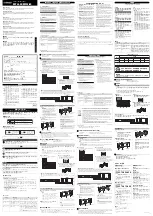
Setting the Solenoid Control Valve
STEP 1
Pre-set pilots as noted:
Opening and Closing Speed
- Turn the adjustment screws on the Closing Speed and Opening Speed Controls, if the main valve is so
equipped, OUT, counterclockwise, 1½ to 2½ turns from full closed position.
STEP 2
Energize the solenoid to check actuation and to confirm connection to power source.
Step 3
Actuate the solenoids so that initial valve filling is against the
closed main valve.
Step 4
To ensure proper operation, any trapped air will need to be bled
off the valve cover during startup. If your ACV includes a bleed
valve, use a flat head screwdriver to slowly open the valve (See
Figure 1).
If your valve does not include a bleed valve, bleed air by loosen-
ing a fitting on the valve or a plug, at the highest point of the valve
assembly.
STEP 5
Pressure the line, by opening the upstream isolation valve slowly
Air is vented through the air bleed valve or loosened fitting.
Tighten the fitting when liquid begins to vent (See Figure 1).
Repeat the process until no air is trapped in the system.
Globe
Angle
Size (in)
1
1/4
1
1/2
2
21/2
3
4
6
8
10
12
14
16
20
24
A (in)
16
16
20
22
22
24
32
34
38
44
48
52
56
56
B (in)
10
10
12
14
14
16
24
26
28
30
34
40
48
48
Size (in)
1
1/4
1
1/2
2
2
1/2
3
4
6
8
10
12
14
16
C (in)
16
16
20
22
22
24
32
34
38
44
48
52
D (in)
10
10
12
14
14
16
24
26
28
30
34
40
Counterclockwise to OPEN
bleed valve
The following tables detail the recommended minimum valve servicing dimensions.
A
B
C
FLOW
FLOW
FLOW
D
FLOW
Valve Servicing Dimensions
Figure 1
Position Indicator
IOM-ACV-113-40_6113-40 2115
EDP# 1917087
© 2021 Watts 3






























